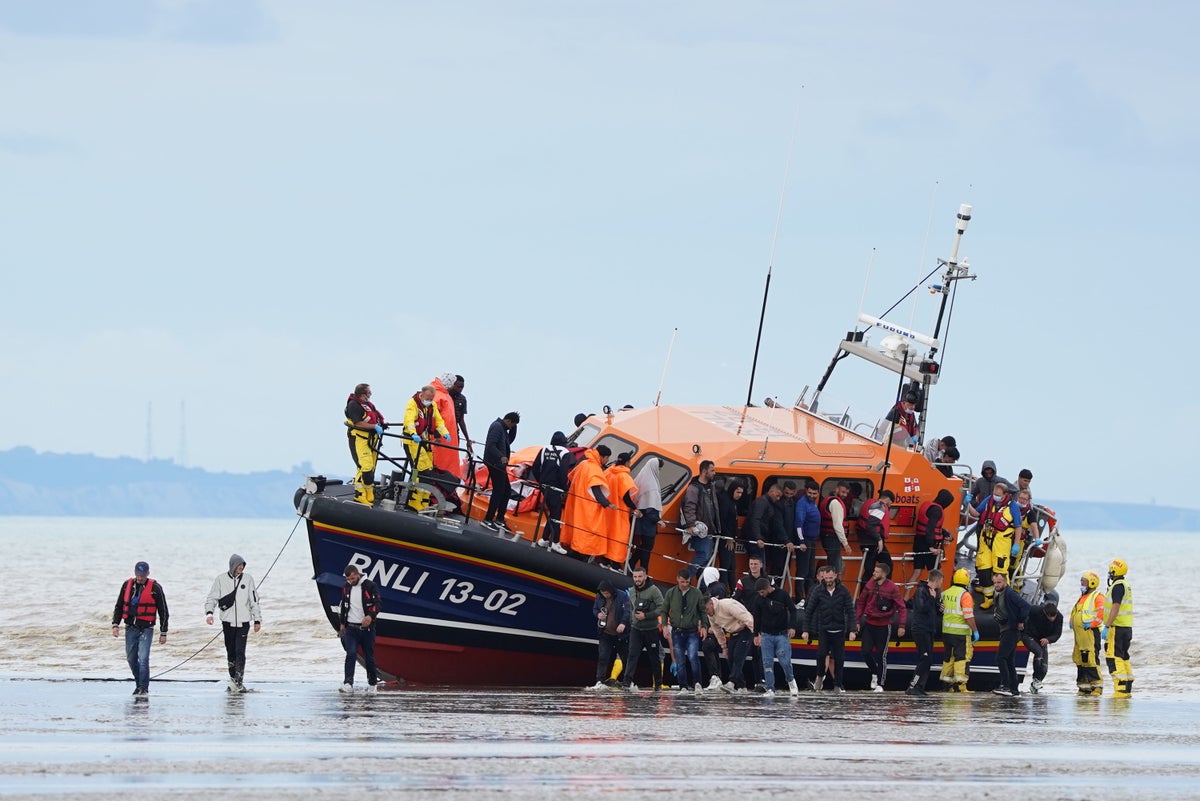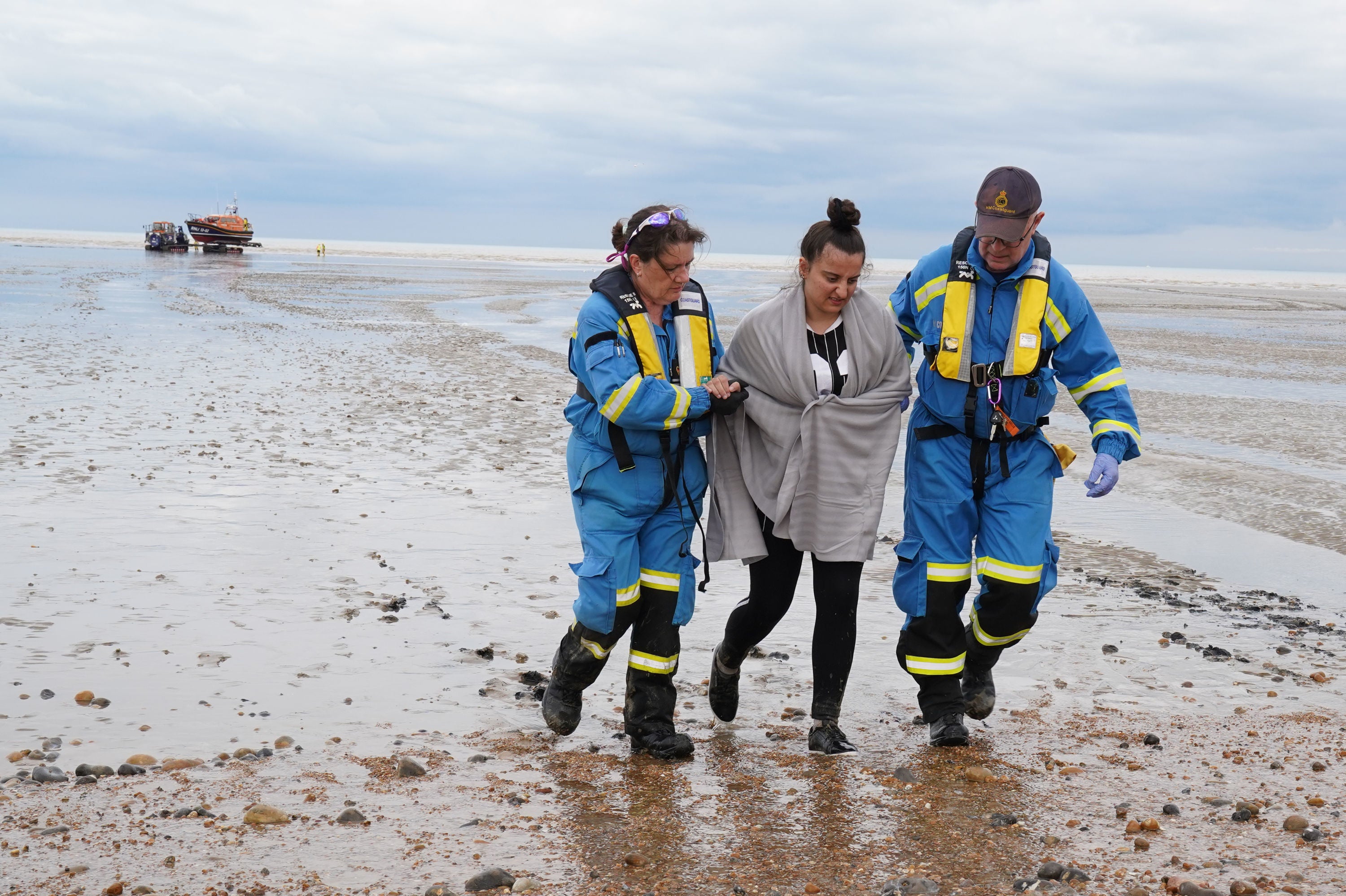
The cost of the UK’s asylum system has topped £2bn a year, with the highest number of claims for two decades and record delays for people awaiting a decision.
Home Office spending on asylum rose by £756m from around £1.4bn in 2020/21 to £2.1bn in 2021/22. This is the highest on record and more than double the amount spent in 2019/20, official figures showed.
The 63,089 applications in the year to June 2022 is also the highest number for any 12-month period since the year to June 2003 when 71,316 applications were made, according to the department.
Officials are understood to be working hard to reduce the backlog of outstanding asylum claims but are struggling to keep up with the number of new applications.
The figures were published as more migrants were brought ashore at Dungeness, in Kent, after crossing the Channel on Thursday and as a “substantial” increase in the number of Albanians among small boat arrivals was reported.
The fact that more than three quarters of men, women and children are recognised as refugees is a stark reminder that we are living through a time of terrible global conflicts which is seeing many people in need of protection— Enver Solomon, Refugee Council
More than 24,200 people have arrived in the UK after navigating busy shipping lanes from France in small boats such as dinghies so far in 2022, according to provisional government figures.
It is almost double the total for the same time last year, with nearly 3,000 people arriving in the last four days.
In the first six months of this year more than half (51 per cent) of small boat arrivals were Albanians (18 per cent), Afghans (18 per cent) and Iranians (15 per cent).
The number of Afghans making the journey has risen since the Taliban’s takeover of Kabul last year, the Home Office said.
The latest asylum figures show the most applications came from Iranians (10,752).
The second highest number was from Albanians, with 7,267 made in the year to June and a grant rate of 53 per cent.
Third were Iraqis (6,824), followed by Afghans (5,024) and Eritreans (4,711).
Officials believe the high grant rate for Albanians – possibly down to more vulnerable people including women and children being processed – is likely to change as the recent rise in small boats arrivals is processed.
The vast majority of Albanians who entered the system in the past six months – thought to be mainly young men – are yet to receive a decision.

The government is also seeing increases in claims from nationalities which have traditionally seen a high proportion of applications granted due to instability in their home countries.
More than 90 per cent of applications from Afghan, Eritrean, Syrian and Sudanese asylum seekers are granted.
At the end of June, 117,945 people were waiting for an initial decision on their asylum application.
This is up 66 per cent on a year earlier, when 70,905 people were waiting.
It is more than double the number in March 2020 at the start of the pandemic (51,906) and a new all-time high since current records began in June 2010.
At the end of June, 85,917 people had been waiting more than six months for an initial decision on their application.
This is up 59 per cent from 54,040 a year earlier and is also the highest number on record.
Of the 50,297 people who arrived on small boats between January 2018 and June 2022, 94 per cent (47,306) applied for asylum.
The Government urgently needs to focus on making the UK asylum system more accessible and efficient— Steve Valdez-Symonds, Amnesty International UK
But only a small proportion have been processed.
Of those who have so far received an initial decision (6,910), 49 per cent (3,378) were granted asylum or another type of leave.
Enver Solomon, chief executive of the Refugee Council, said: “The fact that more than three-quarters of men, women and children are recognised as refugees is a stark reminder that we are living through a time of terrible global conflicts which is seeing many people in need of protection.
“We remain deeply concerned by the fact that the numbers of people living in limbo and poverty while they wait for a decision on their claim has soared to a record high. It is a major failing of this government that our asylum system doesn’t work more efficiently and humanely to prevent this happening.”
Meanwhile, campaigners called on the candidates to be the next prime minister, Liz Truss and Rishi Sunak, to commit to lifting a ban on asylum seekers working while they await the outcome of their claim.
The Lift the Ban Coalition said people who have made a claim should be allowed to work after six months of waiting for a decision.
The significant increase of people making dangerous small boats crossings continues to pressurise the UK’s asylum system and our ability to make timely casework decisions— Minister Simon Baynes
Illegal migration minister Simon Baynes said: “The significant increase of people making dangerous small boats crossings continues to pressurise the UK’s asylum system and our ability to make timely casework decisions.
“Anyone who is travelling through safe countries to reach the UK should claim asylum there instead of giving money to evil criminal gangs.
“Our new plan for immigration, including our migration and economic development partnership with Rwanda, will fix the broken system, crack down on those who enter illegally and allow us to support those in genuine need.”







